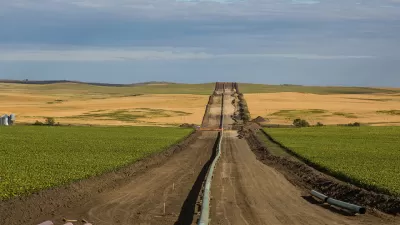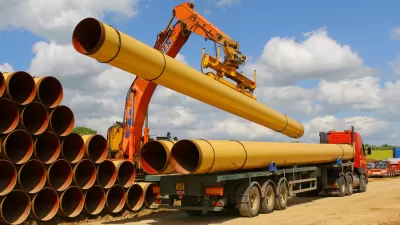TransCanada got its second wish. Last March, President Trump reversed President Obama's rejection of the 1,136-mile pipeline to carry Alberta oil sands crude. On Monday, the Nebraska Public Service Commission OK'd a route, but not the one it wanted.

Just four days after a massive 5,000-barrel heavy oil spill, the Nebraska Public Service Commission (PSC) voted 3-2 on Monday to authorize TransCanada to build its second oil pipeline, Keystone XL, through the Cornhusker State. Thursday's spill in neighboring South Dakota resulted from a rupture in the original Keystone pipeline which has been in operation since 2010, transporting about 500,000 barrels daily of Canadian oil sands crude 2,147 miles from Hardisty, Alberta to Steele City, Neb. and Patoka, Ill.
"But the five-member commission rejected TransCanada’s preferred route and voted to approve an alternative plan that would move the pipeline further east," reports Steven Mufson for The Washington Post on Nov. 20.
The route of the new pipeline, which would carry 830,000 barrels a day of crude, would circumvent more of the state’s ecologically delicate Sandhills region.
However, the approved route would "still cross small shallow parts of the Ogallala aquifer, the main source of drinking and irrigation water in Nebraska and much of the Great Plains."
New route presents challenges for TransCanada
The commission’s decision to back an alternative route could complicate TransCanada’s plans, forcing the pipeline company to arrange easements from different landowners. In its submissions, TransCanada had portrayed the alternative route as unworkable. Further litigation is likely.
Indeed, some pipeline opponents reacted as if the PSC decision was a victory.
“It is a huge victory for us today,” Jane Kleeb, long-time foe of the pipeline and now head of the Nebraska Democratic Party, said in an email. She said “it opens all sorts of legal challenges.”
The reaction from TransCanada on the ruling was guarded: "As a result of today's decision, we will conduct a careful review of the Public Service Commission's ruling while assessing how the decision would impact the cost and schedule of the project," said Russ Girling, TransCanada's president and chief executive officer."
A positive response was offered by Wood Mackenzie energy analyst Zachary Rogers in an email to Mufson: "Nebraska’s decision today greatly diminishes the political risk for the project, likely clearing the way for increased volumes of West Canadian heavy crude to reach the Gulf Coast.”
However, as Planetizen noted Saturday, TransCanada also has to weigh market conditions since oils sands crude is more expensive to produce. Wood Mackenzie has posted a report on peak oil demand. "High-carbon and high-cost/low margin assets — such as oil sands — will be sold down," states their Nov. 8 editorial. TransCanada hopes to also transport Bakken Shale crude from North Dakota in Keystone XL.
As for Thursday's oil spill, it turns out that the Public Service Commission was prohibited from considering it in their decision pursuant to the state's Major Oil Pipeline Siting Act as noted in the 2015 PSC's press release [pdf].

Alabama: Trump Terminates Settlements for Black Communities Harmed By Raw Sewage
Trump deemed the landmark civil rights agreement “illegal DEI and environmental justice policy.”

Study: Maui’s Plan to Convert Vacation Rentals to Long-Term Housing Could Cause Nearly $1 Billion Economic Loss
The plan would reduce visitor accommodation by 25% resulting in 1,900 jobs lost.

Planetizen Federal Action Tracker
A weekly monitor of how Trump’s orders and actions are impacting planners and planning in America.

Wind Energy on the Rise Despite Federal Policy Reversal
The Trump administration is revoking federal support for renewable energy, but demand for new projects continues unabated.

Passengers Flock to Caltrain After Electrification
The new electric trains are running faster and more reliably, leading to strong ridership growth on the Bay Area rail system.

Texas Churches Rally Behind ‘Yes in God’s Back Yard’ Legislation
Religious leaders want the state to reduce zoning regulations to streamline leasing church-owned land to housing developers.
Urban Design for Planners 1: Software Tools
This six-course series explores essential urban design concepts using open source software and equips planners with the tools they need to participate fully in the urban design process.
Planning for Universal Design
Learn the tools for implementing Universal Design in planning regulations.
Caltrans
Smith Gee Studio
Institute for Housing and Urban Development Studies (IHS)
City of Grandview
Harvard GSD Executive Education
Toledo-Lucas County Plan Commissions
Salt Lake City
NYU Wagner Graduate School of Public Service




























